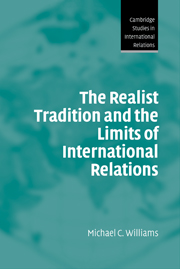Book contents
4 - The tyranny of false polarities
Published online by Cambridge University Press: 22 September 2009
Summary
‘All reification is a forgetting’
Theodor AdornoThe preceding chapters have argued that upon closer examination three classic figures of the ‘Realist tradition’ bear little resemblance to their standard portrayals in International Relations. This chapter seeks to explore some of the contemporary theoretical implications of this argument. I will try to show that an appreciation of this legacy not only challenges the role scripted for ‘Realism’ within much of International Relations theory, but poses fundamental challenges to some of the major categorical divides which structure its debates and define its alternatives.
To make this case, I look at three such divisions: Realism versus liberalism, rationalism versus constructivism, and modernism versus postmodernism. These divides are not wholly lacking in plausibility, however they are frequently deeply misleading and have led to a reified (and often caricatured) set of oppositions rather than a framework for substantive engagement with the theoretical and political issues involved. In light of recent discussions about the possibilities of, and need for, ‘dialogue’ across theoretical positions, a re-evaluation of the Realist tradition can help to reopen conceptual contrasts which have themselves become ‘traditions’ structuring theoretical debates, and which tend to act as barriers to discussion and dialogue rather than as facilitating structures for it.
Liberalism versus Realism
One of the primary implications of the argument pursued in the previous three chapters is that one of the oldest and most pervasive contrasts in International Relations theory — the strict division between liberalism and Realism — is fundamentally misleading both in itself, and as a way of thinking about the evolution of Realism.
- Type
- Chapter
- Information
- The Realist Tradition and the Limits of International Relations , pp. 128 - 168Publisher: Cambridge University PressPrint publication year: 2005

